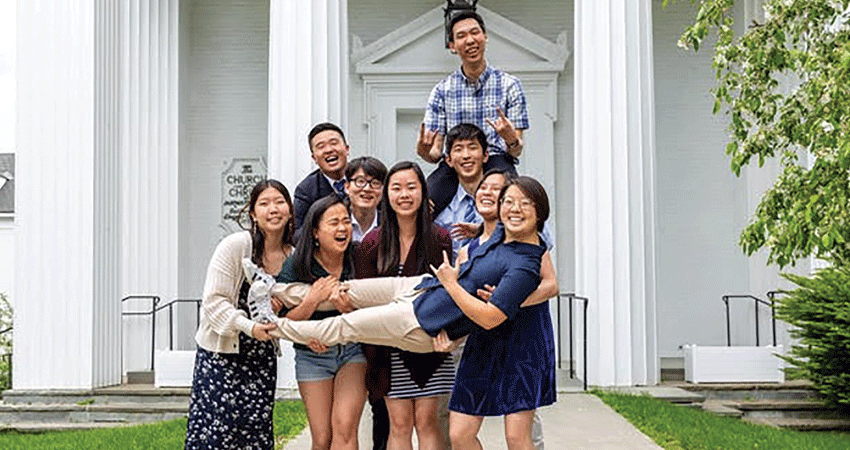Dave Evans Lectures at Cornell
By Zachary Lee, Cornell ’20
In September, the Charles H. Dyson School of Applied Economics and Management at Cornell University hosted Stanford Professor and author Dave Evans, who spoke about how the application of design thinking can bring fulfillment and meaning. Evans, co-author of the New York Times’ bestseller, Designing Your Life: How to Build a Well-Lived, Joyful Life, appeared as part of the Dyson Dean’s Distinguished Speaker Series.
Featuring his signature rapid-fire wit and humor, Evans lit up a full Statler Auditorium with anecdotes and constructive advice, speaking right to Cornell students’ penchant for problem solving and strategy. Even though he did not share specifically about his faith, an astute ear could catch allusions to Christianity. Evans previously wrote a companion to Designing Your Life that dives deeper into the themes of the book and examines their place within the Christian worldview.
 Evans, who holds a BS (’75) and MS (’76) in Mechanical Engineering from Stanford, is the co-founder of Electronics Arts, a global leader in the gaming industry. He also worked at Apple, where he “led product marketing for the mouse team and introduced laser printing to the masses,” according to his Stanford bio. In an exclusive interview with Christian Union: The Magazine, Evans talked about how faith meshes with Designing Your Life, and how the subject is universal.
Evans, who holds a BS (’75) and MS (’76) in Mechanical Engineering from Stanford, is the co-founder of Electronics Arts, a global leader in the gaming industry. He also worked at Apple, where he “led product marketing for the mouse team and introduced laser printing to the masses,” according to his Stanford bio. In an exclusive interview with Christian Union: The Magazine, Evans talked about how faith meshes with Designing Your Life, and how the subject is universal.
Even though he has many opportunities to “prototype” his talk at conclaves from Praxis to TEDx, Evans does not see a need to modify or change much content depending on the audience.
“In any given context, I am dealing with people who decide their lives matter to them,” he said. “The answer to ‘what do I do with it’ is not self-evident or trivial, and they are willing at least to engage in a conversation for help outside of themselves to address the answers to those questions. Change is inevitable, but growth is optional, and those who are actively seeking the answer to that question are those seeking growth. Hopefully, I am just one guide on that journey.”
Evans’ co-author is Bill Burnett, executive director of Stanford’s Designing Your Life program. At the request of the university, Evans and Burnett developed two courses, Designing Your Stanford (for underclassmen) and Designing Your Life (for upperclassmen). The goal was to have students “equipped as they arrive to the campus” and “prepared as they leave,” said Evans, a lecturer in Stanford’s Mechanical Engineering Department.
Evans encourages students to “curate their curiosity”—identify what they find interesting and experiment and see if that is what they truly want to do. This can be a challenge that can be stressful instead of life-giving at a university with so many options.
Additionally, Evans acknowledged that within Christianity, there often is a tension from having our own plans, but knowing that the Lord is the one who ultimately guides our steps. However, he said that people can be humble about designing their lives and excited about their possibilities as well; the two do not have to be mutually exclusive.
“There are three players in the call-discernment-path negotiation,” Evans said. “There’s me, there’s the world, and there’s God, i.e., ‘What do I like, what’s the world doing and saying, and what’s God directing?’ It is easy to get stuck on a binary and dual form of thinking. We often think of God as the Designer and [ourselves] as the receiver. But what if it’s a co-design? Discerning this [involves] active listening coupled with obedience. We have the freedom to prototype our different life experiences, fail, and then learn. Discernment comes from being in the lived reality of God’s creation. . . The strategy isn’t ‘I discern in spiritual land’ and then ‘I join Earth to do it.’ Evans stresses the importance of being “a 3D Christian.”
“Be theologically competent so you have something to say, professionally competent in order to have credibility, and you need to be spiritually mature in order to have substance,” he said. “Your brain, heart, and feet must all be world class. This life we live is a stewardship job and it is a high bar.”



